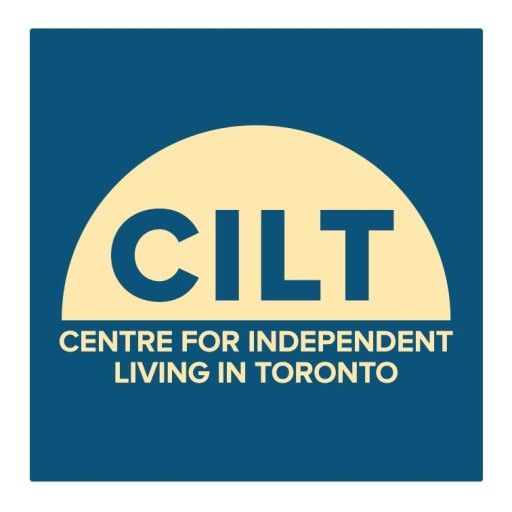The Centre for Independent Living in Toronto is proud to present:
The Helen Henderson Literary Award
This award will be granted to a CILT member, or an ally recommended by a CILT member, who produced an outstanding piece of writing related to raising public awareness of a disability issue or barrier. Award recipient will receive a Lifetime Membership at CILT, and a cash prize of $200. Current employees of CILT cannot apply.
SUBMISSION DEADLINE: September 22nd, 2023 by 5:00 pm
ELIGIBILITY CRITIERIA:
•One (1) published piece of writing (published on a website, blog, open letter to the editor orin a journal, newsletter or magazine);
•Submission must be in English or French;
•Minimum 700 words; maximum 3000 words;
•Addresses at least one (1) disability issue or barrier;
APPLICATION PROCEDURES:
1.Please complete the application form, below.
2.Please print or include a digital link of your published piece with your application.
3.Please include a personal statement describing the published piece, including its significance to the disability community and your interest in the topic.
•Personal Statement: 1 page, single-spaced, 12-point font, Arial, 2.5 cm margins
4.Please include one (1) letter of reference or support from a CILT member (only applicable to those applicants who are not CILT members upon applying).
Submit your completed application by mail or email to:
Helen Henderson Literary Award Nomination Application
Email: cilt@cilt.ca
AWARD:
•Lifetime Membership at CILT; and,
•Cash prize of $200.
ABOUT HELEN HENDERSON
Helen Henderson was a writer and journalist. After being diagnosed with multiple sclerosis in the 1970s Helen Henderson began writing a pioneering column in the Toronto Star— a mixture of information and advocacy — that brought issues faced by disabled people into mainstream conversation. Helen passed away in April of 2015, in a year when she was president of the Board of CILT. The following text is an excerpt from an article written by Donald Barrie, (CILT Board Member).
“Helen Henderson, renowned as a journalist and advocate for people with disabilities, died April 11 after being diagnosed with lung cancer in February. She was 68 years old. Henderson, who for many years wrote about disability and related issues for the Toronto Star, joined the board of directors of the Centre for Independent Living in Toronto (CILT) in 2013. Her participation on the board began five years after retiring from the Star. In October 2014, she was elected as the president of CILT.
Originally from Scotland, Henderson and her family moved to Canada when she was eight years old. She always wanted to be a writer, and her strong communication skills were noticed by her family at an early age. Henderson earned English degrees from Bishop’s University in Quebec and the University of Toronto.
Henderson’s career at the Star began in 1971. The self-taught journalist initially worked as a business reporter. When she was diagnosed with multiple sclerosis in the late ’70s, she vigorously fought to maintain her independence.
“She had a lot of anger and upset (feelings),” recalled her younger sister, Lindsay Campbell. “Her life was going at 100 miles an hour, and when forced to live with MS, she felt she had hit a brick wall.”
Henderson persevered, and after moving to the Star’s Life section she pitched the idea of writing a column about people with disabilities and the issues they face. Until then, there was nobody at the Star addressing disability issues on a regular basis.
“She was able to connect with the grassroots issues and put them in the mainstream,” CILT’s Executive Director Sandra Carpenter told the Star.
Among those issues, Henderson provided critical coverage in the early days of the Direct Funding Program – Self-Managed Attendant Services, a provincial program administered by CILT that funds adults with physical disabilities to manage their own attendant services independently.
“Through her articles she focused a spotlight on Direct Funding from concept and promise stage, to pilot project and beyond,” said Ian Parker, the former manager of the Direct Funding Program and current senior advisor at CILT. “When it became a full, ongoing program, she continued with her support by highlighting, for example, the impact of insufficient hours on consumers with communication disabilities, or lengthy wait lists on those who have no services.
“Throughout, she always portrayed the direct funding model of service as such a reasonable and straightforward idea for meeting people’s needs and aspirations, helping others to see it this way too.”
Henderson was chair of the CILT board when she received her diagnosis and resigned. Ryerson University posthumously recognized Henderson as a graduate of the Disability Studies program when it awarded her degree to her family. Ryerson also established the Helen Henderson Writing Award for Disability Activism. The award will be presented for the first time in 2016.
“She finally came into her own when she went to Ryerson and got involved with CILT,” Campbell said. Those experiences brought her a lot of peace and acceptance of who she was as a person with a disability, she added.
In an obituary published by the Star, Henderson related some of her final thoughts to her sister: “I’ve done everything pretty much that I wanted to do. I’m very proud of what I’ve done in my life and if this is it, this is it’.”







